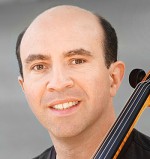Column Name
Title
Subhead
The seeds were planted for Nat Chaitkin’s career shift quite a while ago, when he was walking through his University of Michigan dorm passing out fliers for his cello recital. As he told The Journal recently by phone, “A guy named Steve said, ‘No offense, man, but I hate what you do.’” No offense was taken, but over time, Chaitkin (Pre-College ’87) kept thinking about what Steve said about not liking classical music.
Body
Growing up in New York City, Chaitkin’s first cello teacher was Ardyth Alton (Postgraduate Diploma ’44, cello; faculty 1965-2007)—it was through her he ended up in Pre-College; one of his later teachers was David Soyer (faculty 2003-10). In part because he was studying cello, and in part because his father, David Chaitkin, was a composer, “I grew up spending a lot of time going to [classical] concerts, but I was also listening to a lot of Jimi Hendrix,” Chaitkin said. “So to me, it was very natural to have all these types of music mixed up in my head, but often classical is a missing piece. I started asking myself, since on a basic level all music is the same, what’s the connection that some people don’t have to the music I play and love so much? What are ways to start where people are and connect them to what I do in a way that makes sense to them without the intimidation of a concert setting?”
These questions kept percolating over the next couple of decades, during which time Chaitkin worked as a cellist in Washington, D.C., Michigan, and finally Cincinnati—his wife, Marie-France Lefebvre, an opera coach, teaches at the University of Cincinnati College-Conservatory of Music (C.C.M.); they have a 13-year-old daughter and 7-year-old son. And in 2012, he settled on what he might be able to do for the Steves of the world. That year, he got a grant from the city of Cincinnati to start Bach and Boombox, an educational program that, as he puts it, “de-classifies the classics.” It consists of 45- or 60-minute presentations (the length depends on the audience age) at schools, businesses, or community centers. Chaitkin plays classical music on his cello and shows audiences the music’s parallels with popular music, delivered via boombox. A few hours after we spoke, he gave a presentation at a library in Kentucky.
While the pop music can range from the Beastie Boys and Miles Davis to Glenn Miller, Chaitkin pretty much always includes James Brown. “People light up when you start playing his music,” he said. “I use him to explain the minuet in trio—A-B-A form. All those famous James Brown records from the late ’60s—they’re just two chords,” he added. So he tells the audience that “if you go to a classical concert, you might hear something called ‘rounded binary form,’ and that doesn’t sound so interesting. But there’s another way to put it—and then I put on the bridge of James Brown’s Cold Sweat, which they love, and explain that that’s it—minuet in trio form.”
Chaitkin works with audiences of all ages, and while he finds that younger people have more of an open mind about what is and isn’t music, he likes the challenge of people asking “why is this guy with a cello in our board room?” he said. “In the end, hopefully, I’ll have gotten their attention in a way they didn’t expect.” For many people, he added, “the barrier to going to a classical music concert has more to do with a setting that can be a little off-putting. I say, start with the understanding the music, and then you’re as equipped to go to a concert as anyone else.”
While Chaitkin still freelances with Pro Musica Chamber Orchestra in Columbus, Ohio, and the Cincinnati Symphony, and teaches at C.C.M.’s preparatory division, he’s found that Bach and Boombox has also changed the way he listens to music. “My daughter always has the local pop station on in the car, and one day it hit me that the pop song she’d been blasting, “Impossible” by Shontelle, has a sequence that could be from a Handel aria,” he said. Just like many of the Steves in his audiences, he’d had preconceived notions, but now “I find things I like in Justin Timberlake songs, and I’m not sure I would have five years ago.”
Another aspect of running a business has meshed well with Chaitkin’s freelance life, he’s found. “So much of what my musical training has given me lead very naturally to being an entrepreneur,” he said. “Musicians are always looking for different ways to expand what we’re doing and become more effective in our presentation of what’s inside us.”





